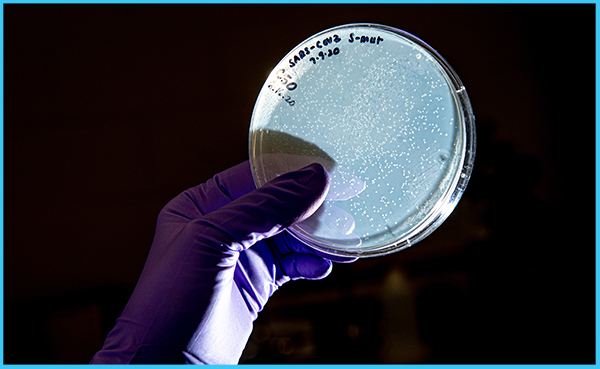
Kansas State University (K-State) has signed four COVID-19-related licensing agreements with companies for vaccine candidates and possible antiviral drugs. All the licensing agreements have been coordinated through K-State Innovation Partners.
 In one research agreement with clinical-stage biopharmaceutical company Tonix Pharmaceuticals, scientist Waithaka Mwangi is studying a COVID-19 vaccine candidate at the K-State Biosecurity Research Institute. The research is based on a new vaccine platform that his team developed for bovine parainfluenza 3 virus, known as BPI3V, which is closely related to human parainfluenza 3 virus.
In one research agreement with clinical-stage biopharmaceutical company Tonix Pharmaceuticals, scientist Waithaka Mwangi is studying a COVID-19 vaccine candidate at the K-State Biosecurity Research Institute. The research is based on a new vaccine platform that his team developed for bovine parainfluenza 3 virus, known as BPI3V, which is closely related to human parainfluenza 3 virus.
Mwangi, Professor of Diagnostic Medicine and Pathobiology in the College of Veterinary Medicine, and his team have focused on the most critical protein of coronaviruses: the spike protein. When a person is exposed to the virus, this protein is involved in the infection of the host cell. The vaccine candidate developed at K-State has been engineered to display the spike protein in a manner that mimics the actual virus.
Instead of being injected, Mwangi’s vaccine candidate could be sprayed in the nose to trigger immune protection and block the virus’s spike protein from infecting the host cells. The vaccine also would induce T-cell responses capable of killing infected cells.
“A weakened BPI3V has previously been shown to be an effective vaccine vehicle in humans. More importantly, following extensive testing, BPI3V was shown to be safe and stable in infants and children,” Mwangi said. “The vector is well suited for mucosal immunization using a nasal atomizer, but it can also be injected. Therefore, BPI3V is suitable for development of COVID-19 vaccine candidates.”
Read more about the vaccine developmentand other K-State COVID-19 research in Seek magazine.